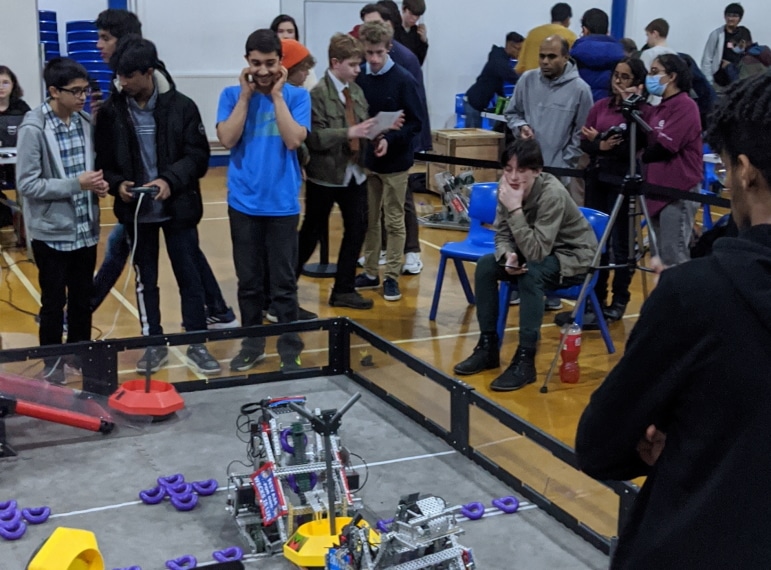
Ten VEX robotics teams from QE – a School record – have won places at next month’s World Championships in the USA.
Their qualification follows a string of mid-season successes, including triumphs on home territory at the QE-hosted North London regional rounds of the junior IQ and senior VRC teams.
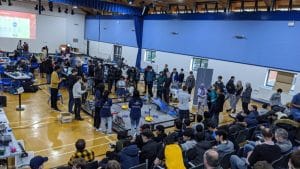 Congratulating them, Headmaster Neil Enright said: “Our robotics teams march on to ever-greater success, thanks to their technical skills, teamwork and great commitment.
Congratulating them, Headmaster Neil Enright said: “Our robotics teams march on to ever-greater success, thanks to their technical skills, teamwork and great commitment.
“I wish them all the best for the national championships in Telford and then for Dallas in May.”
The qualifiers include six Vex IQ Challenge (VIQC) teams from Years 8 & 9 – Gearsquad, Nova, Eclipse, The Rubber Bands, CyberForce and Shattersquad – and four VRC teams from Years 10 & 12 – HYBRID, Vortex Invicta, Hex-Green and Hyperion.
In addition to its main current competitions (Pitching In for IQ teams and Tipping Point for VRC), VEX also organises a series of subsidiary challenges and competitive online events.
Among all recent VIQC highlights are:
- Five QE teams holding a top-20 place in national skills rankings. Five were also finalists in the World Online challenge (the School’s previous best was one), gaining them automatic entry to the World Championships;
- Gearsquad’s gaining of Excellence and Skills awards at the QE-hosted event, which secured them early qualification for the ‘Worlds’. At this point, Gearsquad also boasted the highest skills score in the UK;
- Nova’s victory in the QE-hosted tournament. Nova were also finalists in the Career Readiness Online challenge, finalists in the Poster Design online challenge and among the winners in the VIQC STEM Research Project competition with their entry, Camelid Antibodies.
- Eclipse taking first prize in the Theme it up online challenge, which involved creating and presenting a theme that ties the current IQ game’s objects, scoring, and rules into an engaging and creative story. Eclipse also won the double Teamwork Champion & Design awards at the Essex regional event;
- The Rubber Bands gaining a ‘triple’ – the Excellence, Teamwork Champion and Skills Champion awards at the Essex event – as well as being among the winners in the STEM Research Project with their entry, The Foginator, and a runner-up in the Career Readiness online challenge.
- Cyberforce’s winning of the Poster Design Online challenge.
Head of Technology Michael Noonan also paid tribute “Shattersquad for their sheer determination in increasing their skills score at the Worlds Qualifier event, securing one of the last seats on the plane to Texas”.
Among Spring Term VRC successes are:
- HYBRID winning the Innovate award at the World Championship qualifier event in early March, and placing second in Skills at the Essex VRC regional event;
- Year 10’s Panth Patel and Tharsan Nimalan on being selected as the newest members of their respective teams through their online challenge efforts; Panth joined team Vortex Invicta; Tharsan the experienced Hex-Green;
- Hex-Green’s number 1 ranking in the UK for Skills, with a combined score for driver and programming skills of 430 ahead by a distance of the second-top team, on 386;
- Hex-Green’s multiple competition successes: Excellence Award winner and overall runners-up at the Stowe Regional; Tournament Champion and Skills Champion at the QE-hosted North London Regional; Excellence Award and Skills Champion at the GCA Regional;
- Hyperion’s securing the Excellence Award at the QE North London Regional and winning the Tournament Champions and Design awards at the Stowe VRC Regional.
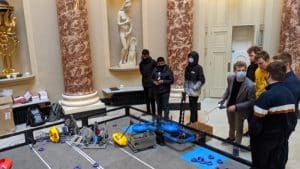 While examination commitments prevent Year 12 from travelling, IQ teams from Years 8 and 9 VRC competitors from Year 10 will all be heading for the States.
While examination commitments prevent Year 12 from travelling, IQ teams from Years 8 and 9 VRC competitors from Year 10 will all be heading for the States.
Mr Noonan looked back on an unprecedently successful term for QE robotics: “The excitement levels were incredible in advance of the day in February day when the online challenge winners were released. We knew this could pave the way for our highest-ever number of teams qualifying for the World Championships, and so it proved!
“I commend all of our teams for their valiant efforts to date, and remind them that our biggest and most exciting challenge lies in wait. Over a two-week period in late April and early May, these teams will travel to Telford and Texas in search of glory!”

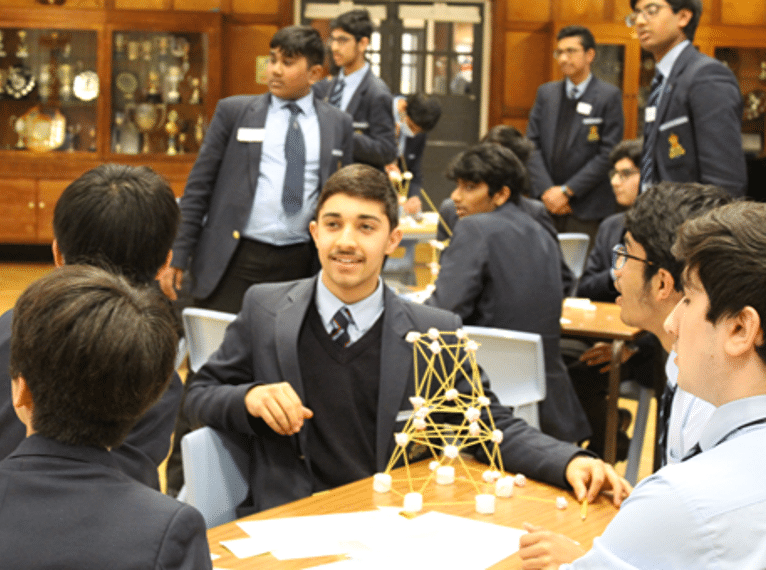
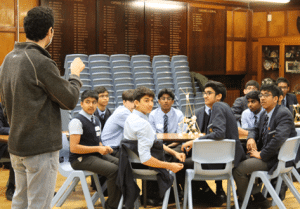 Assistant Head (Pupil Involvement) Crispin Bonham-Carter said: “It was a fun simulation which the boys found tremendously enjoyable, but the overarching purpose was serious indeed: we wanted to get them thinking about all the different aspects of managing a business and to give them the chance to explore and practise skills of entrepreneurship.
Assistant Head (Pupil Involvement) Crispin Bonham-Carter said: “It was a fun simulation which the boys found tremendously enjoyable, but the overarching purpose was serious indeed: we wanted to get them thinking about all the different aspects of managing a business and to give them the chance to explore and practise skills of entrepreneurship.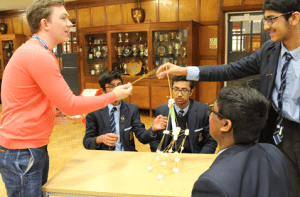 The afternoon session was an extended debrief, in which the various issues and strategies were discussed to draw out lessons that could be applied in real-world situations.
The afternoon session was an extended debrief, in which the various issues and strategies were discussed to draw out lessons that could be applied in real-world situations.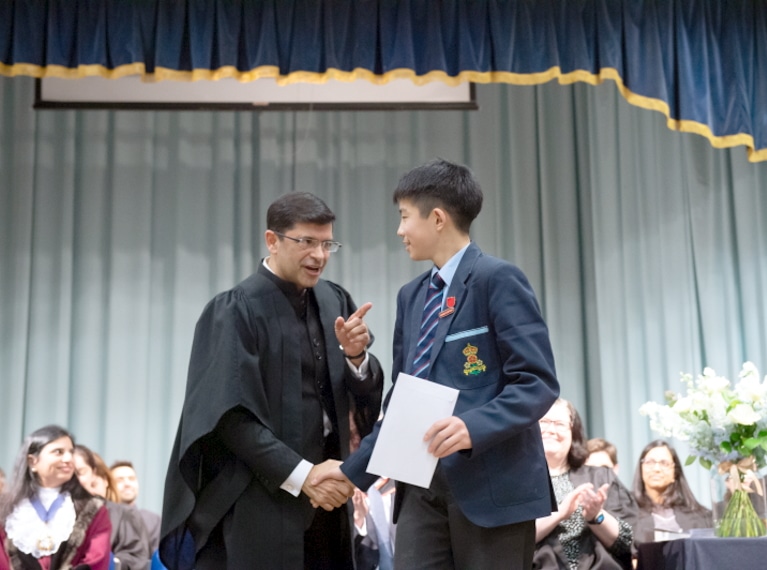
 The formal ceremony in the Main School Hall was this year held in its full format, following the pandemic-restricted event of 2021, with Professor Shitij Kapur the Guest of Honour.
The formal ceremony in the Main School Hall was this year held in its full format, following the pandemic-restricted event of 2021, with Professor Shitij Kapur the Guest of Honour.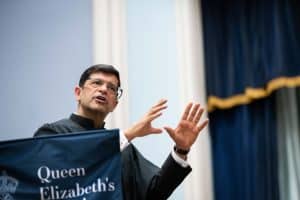 He urged the reading of books, rather than blog posts or articles, and also spoke about how we make decisions in context, pointing out that unpredictable events and developments often govern that context.
He urged the reading of books, rather than blog posts or articles, and also spoke about how we make decisions in context, pointing out that unpredictable events and developments often govern that context.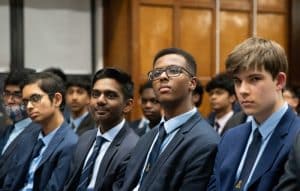 In his speech, the Headmaster highlighted a number of qualities of effective leadership, including bravery, hard work, high standards, low tolerance of bad behaviour, and kindness.
In his speech, the Headmaster highlighted a number of qualities of effective leadership, including bravery, hard work, high standards, low tolerance of bad behaviour, and kindness.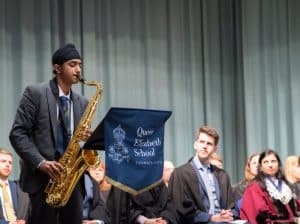 Guests included the Deputy Mayor of the London Borough of Barnet, Councillor Saira Don, who also spoke during the ceremony.
Guests included the Deputy Mayor of the London Borough of Barnet, Councillor Saira Don, who also spoke during the ceremony.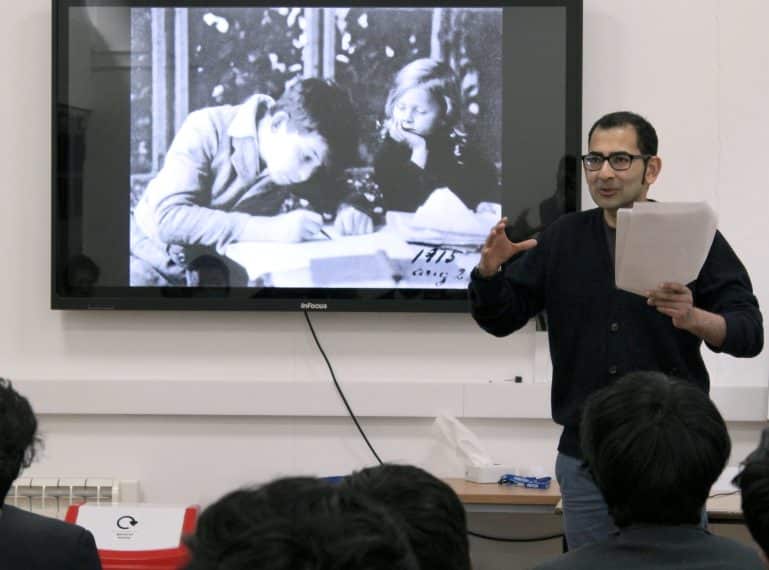
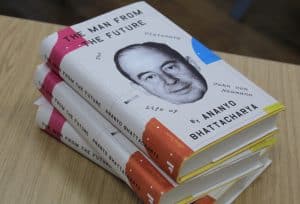 Dr Bhattacharya’s book, entitled The Man from the Future: The Visionary Life of John von Neumann, was named a Financial Times and Times Literary Supplement Book of the Year in 2021.
Dr Bhattacharya’s book, entitled The Man from the Future: The Visionary Life of John von Neumann, was named a Financial Times and Times Literary Supplement Book of the Year in 2021.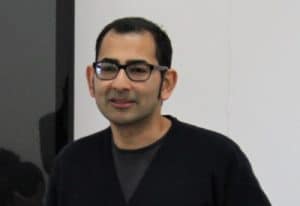 In his talk, Dr Bhattacharya mentioned the Manhattan Project as well as, inter alia, von Neumann’s contributions to set theory, game theory and the development of the first programmable digital computer.
In his talk, Dr Bhattacharya mentioned the Manhattan Project as well as, inter alia, von Neumann’s contributions to set theory, game theory and the development of the first programmable digital computer.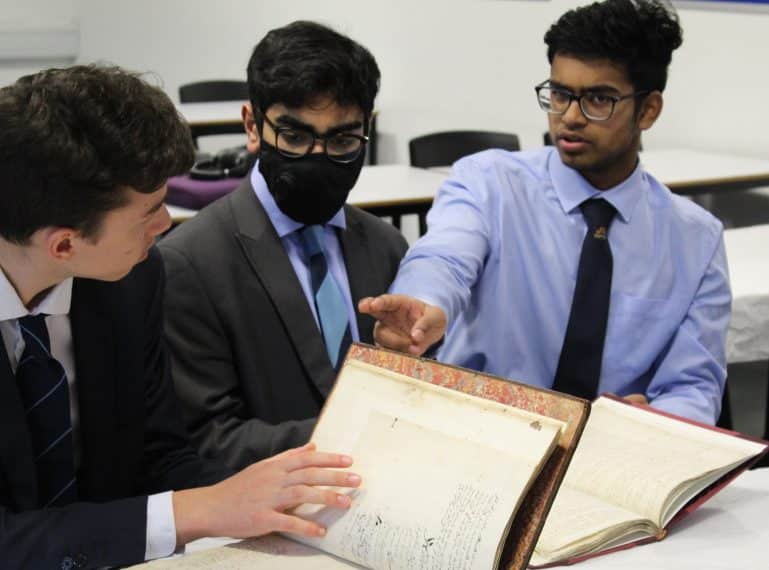
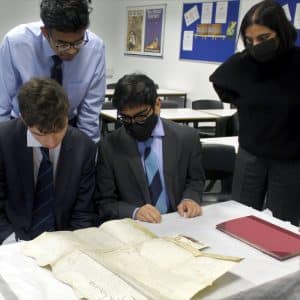 English teacher Kanak Shah has brought together a group of dedicated Year 12 boys and trained them in palaeography – the study of ancient and pre-modern manuscripts.
English teacher Kanak Shah has brought together a group of dedicated Year 12 boys and trained them in palaeography – the study of ancient and pre-modern manuscripts.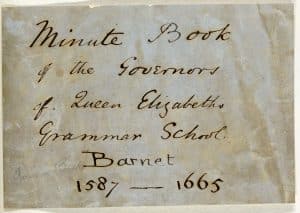 “The earliest documents present an interesting challenge as they were written before the standardisation of handwriting, and so require careful decoding,” said Ms Shah.
“The earliest documents present an interesting challenge as they were written before the standardisation of handwriting, and so require careful decoding,” said Ms Shah.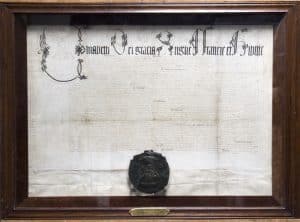 It is not clear who made the the Barnet Museum transcription, which was completed some time prior to 1931. The preface to the museum’s collection of QE translations and transcriptions was written in May 1931 by Cecil L Tripp, author of A History of Queen Elizabeth’s Grammar School, published 1935.
It is not clear who made the the Barnet Museum transcription, which was completed some time prior to 1931. The preface to the museum’s collection of QE translations and transcriptions was written in May 1931 by Cecil L Tripp, author of A History of Queen Elizabeth’s Grammar School, published 1935.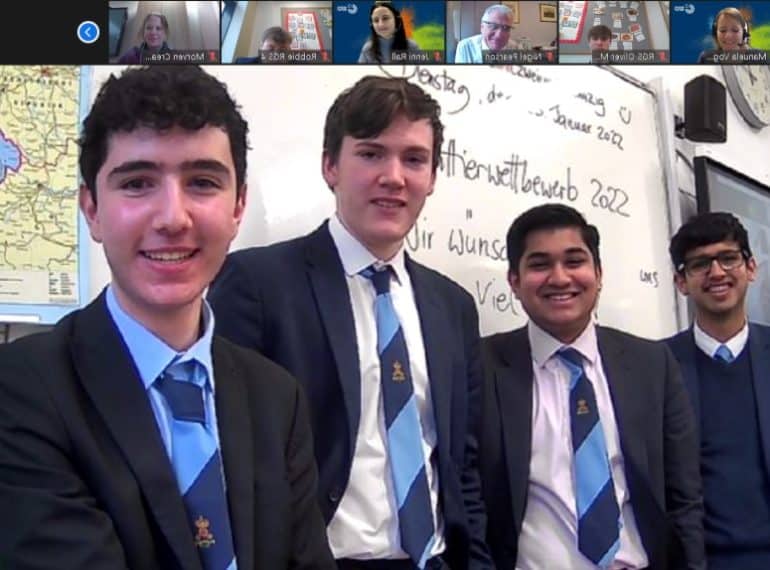
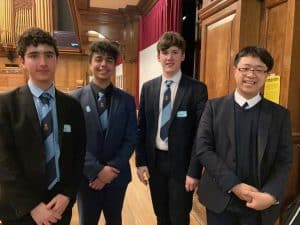 Still basking in their success, current School Captain Theo and classmate Olly were then joined by fellow Year 12 pupils Alan Yee Kin Kan and Antony Yassa for the French debating competition, which was held at St Paul’s Girls’ School.
Still basking in their success, current School Captain Theo and classmate Olly were then joined by fellow Year 12 pupils Alan Yee Kin Kan and Antony Yassa for the French debating competition, which was held at St Paul’s Girls’ School.